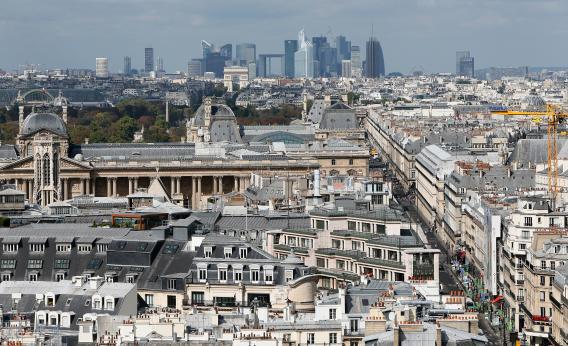I was speaking to an EU official yesterday who was talking about the crisis and mentioned that the European Central Bank’s credit-easing efforts had been implemented in a more conservative way than what the Federal Reserve did, and he said this was to minimize inflation risk. I asked him why the ECB should be worrying about minimizing inflation risk given how low inflation is in the United States and even in Japan.
His reply was that even when the HICP (the European version of the Consumer Price Index) is low, other kinds of prices can be high. For example, he said, real estate in Paris is quite expensive (this was a French guy), which makes things very difficult for young couples looking to start a family or for businesses looking to expand or acquire space.
This, if you ask me, is piling perversion upon pervesion as public policy. The high price of property in Paris ought to be a source of employment and economic strength for France. If property is expensive, then hiring unemployed workers to build new property should be profitable. That would directly increase employment, boost tax revenue, reduce unemployment spending, and reduce the need for harmful austerity policies. What’s more, as the new construction is finished, you’ll see purchases of furniture and other durable goods. More people would move to Paris, and thanks to agglomeration effects, French workers can be substantially more productive in Paris than in more remote French towns. And, of course, with a higher population and more availability of property, there will be more opportunities to open shops and restaurants.
Long story short, if monetary easing boosts the price of real estate assets without leading to a surge in consumer prices, that ought to be a monetary policy success story as your central bank sparks a boom in investment and durable goods purchases.
Now why doesn’t that happen in Paris? I assume it’s because of our old friend: land use restrictions. Paris is a very densely populated city, but it’s essentially “built out,” given the current prohibition on new skyscrapers. Now Paris, unlike Washington, D.C., is a genuinely beautiful city, and these restrictions aren’t pointless or insane. But they are a policy choice, and specifically a policy choice that makes office space scarce and housing unaffordable. To then flip around and cite this as a reason to need tight money is absurd. Among other things, though tight money reduces nominal French real estate prices, it makes Paris housing even less affordable in real terms by reducing employment and incomes. Of course, if you have guaranteed employment at a European Union political institution, maybe you don’t care so much about that. But on the merits, it’s nuts. And it underscores the extent to which “demand stimulus or policy reform” is a false choice.
